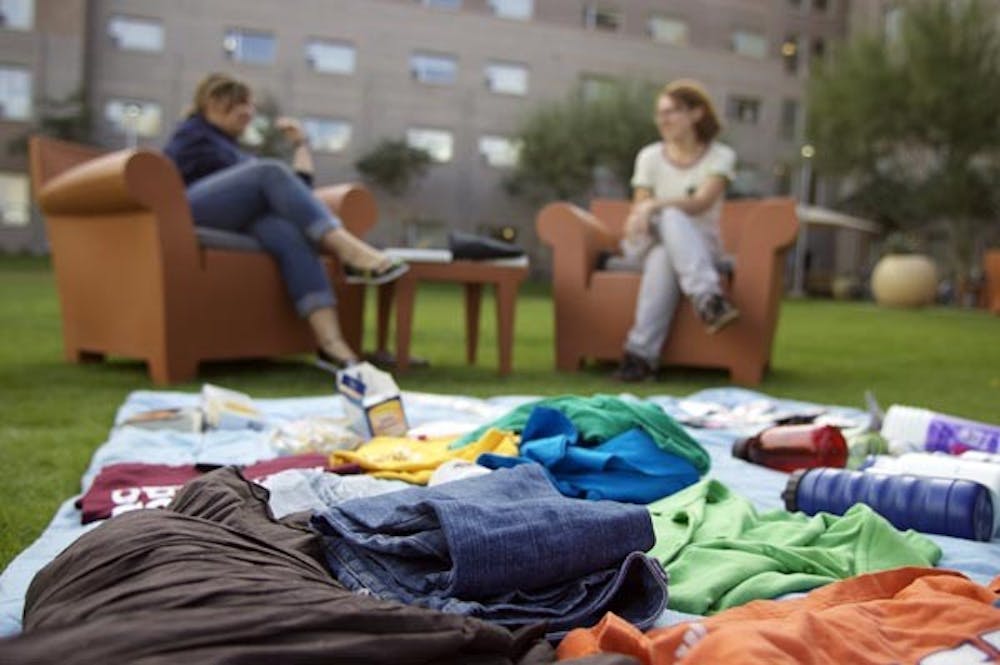Students swapped used clothes, water bottles, jewelry and shoes to kick off ASU’s first No Impact Week on Sunday.
The eight-day initiative, sponsored by the Global Institute of Sustainability, encourages students on the Tempe campus to live greener, said event coordinator Kimberly Pearson, a Spanish literature and sustainability junior.
“No Impact Week is an opportunity for the ASU community to challenge themselves to live mindfully,” Pearson said in an e-mail.
Pearson said 110 students are signed up to take the No Impact Challenge, which reminds students to do an environmentally friendly activity every day.
On Sunday students were asked to refrain from buying anything new.
On Monday students are challenged not to produce any trash and on Tuesday they are asked not to take any transportation that creates pollution.
ASU students from 15 different clubs will host events each day focusing on a new theme, including water consumption and transportation, she said.
The No Impact Project, a nonprofit organization that promotes green living, asked the Global Institute of Sustainability to hold the educational event at ASU Pearson said. Even though sustainability is a theme at the University throughout the year, the Global Institute of Sustainability accepted.
“No Impact Week provided an extended and unique outlet for student activism in the areas of water, energy [and] waste,” Pearson said.
Colin Beavan, a man who lived a year without any modern conveniences starting in 2007, inspired the concept for the week, said Lindsay Buchanan, a program manager for the No Impact Project.
Beavan went without buying any material goods, driving, using electricity and eating non-local food in order to reduce his own personal impact on the environment, she said.
After his nonprofit, No Impact Project, was launched in the spring of 2009, his book “No Impact Man” and documentary of the same name were released later that year, Buchanan said.
The nonprofit organization has helped organize similar events on 10 different university campuses, including NAU and Ohio State University.
“We hope that participants will find that by lowering their impact, they improve their own quality of life as well as the planet's,” Buchanan said.
On Sunday, students focused on consumption at a Stuff Swap hosted by the Sustainability House at Barrett, a residential community in Barrett, the Honors College.
Adeline Hill, a community assistant in the Sustainability House, said buying a new piece of clothing has a negative impact on the environment because it consumes land, water and fossil fuels to produce it.
She said buying used clothes and other goods is an environmentally friendly alternative.
“It puts you in contact with where your clothes are coming from, negating all of those bad impacts by simply choosing to opt out of the system,” Hill said.
Marco Ugarte, a sustainability graduate student, said large community swaps are common in Mexico City, where he is from, and he began giving his unwanted goods to Goodwill last year after seeing the “No Impact Man” documentary about Beavan’s year-long experiment.
“I am glad they brought an opportunity to campus,” Ugarte said
The spirit of the week is not limited to improving the environment, Pearson said, but includes reducing the suffering of other people.
On Tuesday, the ASU Coalition for Human Rights and United Students for Fair Trade will host Maritza Vargas and Gina Cano, who spent years working in Nike sweatshops and now speak out against it.
“We feel that the producers around the world who provide for other people's quality of life should not have to struggle needlessly to provide good lives for themselves and their children,” Pearson said.
The week runs through Nov. 21 and includes a talk by ASU President Michael Crow on Thursday about sustainability in the upcoming decade at 9 a.m. in the Global Institute of Sustainability.
The institute is also hosting a trail restoration project on “A” Mountain Saturday at 9:30 a.m.
Reach the reporter at mary.shinn@asu.edu





